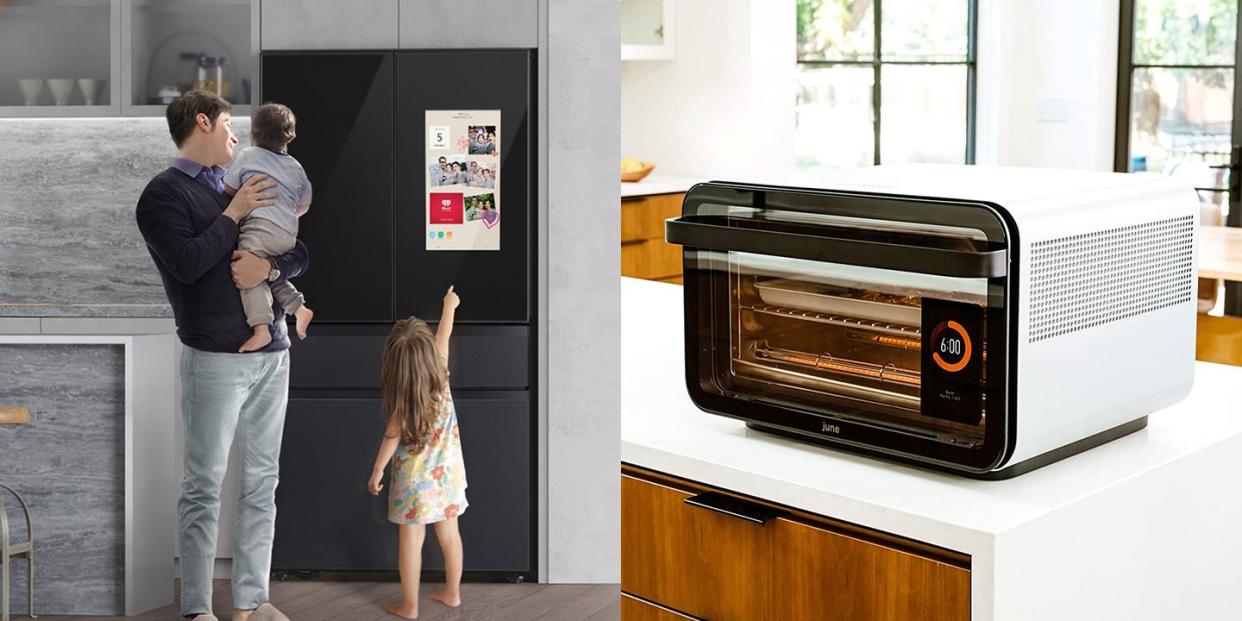Is Smart Tech Making Us Worse Cooks?

"Hearst Magazines and Yahoo may earn commission or revenue on some items through the links below."
“The Heston Cue [smart induction cooktop] is almost like cheating,” said Danny Winget, a YouTuber who reviews smart devices. In a recent video, he’s standing in his very normal-looking kitchen—gray granite countertops, a stainless steel oven with a big hood, and a white subway-tile backsplash. At first glance, you probably wouldn’t be able to notice how high-tech his space really is. But if you look closer, you’ll spot the smart devices: a Samsung Family Hub fridge, a Brava Smart Oven, and a Revolution toaster oven.
“When connected to the app, it takes you step-by-step of how to cook that certain recipe,” Winget continued, referring to the Heston Cue. “All you have to do is follow directions, and the temperature is controlled automatically, so it’s really hard to mess things up.”
Most people don’t have kitchens that are this advanced. Maybe they have a coffee maker that connects to an app or an oven they can preheat on their commute home, but certainly not all the pricey gadgets Winget has. But in the last half a decade, smart kitchen technology has come a long way, from slightly archaic pre-programmed settings on your air fryer to an oven that can detect what you put in it and walk you through recipes.
Many kitchen appliances are called “smart.” Here’s what that means.
In the world of smart technology, there’s no strict definition of what smart actually means. Companies will slap that buzzword on anything with a screen or wifi-capability.
“[Before 2016], when something was considered smart, it had pre-programed cook settings,” said Nicole Papantoniou, Director of the Kitchen Appliances and Culinary Innovation Lab at the Good Housekeeping Institute “What was smart about that is there was a setting built-in with suggested times.”
2016 was the magical year when two smart kitchen appliances first became available. “The June Oven really kicked it off in a way that was user-friendly and able to make updates in technology while the unit was in somebody’s home,” Papantoniou said. The Samsung Family Hub refrigerator, whose first generation was also released that year, was the other major player in the space. The June Oven now has three generations, and the fridge has six.

These days, there are smart blenders, coffee makers, food processors, ovens, toasters, air fryers, and so on. Jennifer Pattison Tuohy, who covers smart technology for The Verge, breaks down smart tech into two categories: a connected appliance and a smart appliance.
“A connected appliance is any appliance that is connected to the internet and allows you to control it remotely through a smartphone, tablet, or computer,” she said. “A smart appliance is a connected appliance, but it also has features that proactively help the user.”
For example, an oven that you can preheat from an app is connected because it uses wifi. But the June Oven, which can detect exactly what you put in it and suggest cook time, temperature, and recipes for that ingredient, is smart.
These appliances may be smart, but are they useful? It depends.
Compared to other rooms, the kitchen has been slow to become smart. Today, you can’t buy a TV without smart technology. Roam the light-bulb aisle and you’ll undoubtedly see smart bulbs that connect to Alexa.
“The kitchen is already a very technologically advanced room,” Touchy said. “Compared to, say, our bedrooms or our living rooms, pretty much everything in it is technology.”
The smart technology that is integrated in the kitchen is cool, but doesn’t feel that useful to the experts. “It’s hard for me to get on board with the camera in the fridge,” Papantoniou said of the Samsung Family Hub fridge, which has an interior camera that connects to your smartphone. “How often are people actually accessing that camera while they are at the grocery store? Is that something usable?”
Even Danny Winget’s wife, Holly Winget, admitted in that same video they don’t use their own Samsung fridge to its full capability. “We tend to use it to showcase our beautiful children,” she said, pointing to the screen with photos. This is an issue in the smart technology kitchen world. As Tuohy puts it, all this tech is offering “a solution in search of a problem right now.”

“[Eventually,] your fridge will know what you have to eat and can tell your oven what you're going to cook tonight, so your oven can preheat to the right temperature,” she said of the smart technology brands trying to get appliances to communicate with each other. That isn’t something smart kitchen appliances are capable of yet. Right now, all you can do is see the inside of your fridge or preheat your oven from afar. “The problem is, do people really want that?” she continued. “Is that really useful? And is it that hard to preheat your oven?”
At first, Papantoniou thought having a coffee maker that she could turn on and off from her bed felt superfluous. But now, she loves it. “Things that felt silly before are becoming more natural, normal, and kind of expected,” she said.
Who is this technology meant for and how will it affect the way we cook?
For Papantoniou, smart kitchens are for the already tech-savvy and tech-interested. “These are people who already have technology built into their lives, and they want to try something new,” she said. It’s not for the comfortable at-home cooks who want an oven to tell them how to roast a chicken.
Edward Moon, Chef Instructor at the School of Hospitality Management and the Culinary Institute of New York at Monroe College, is also skeptical. “If you cut up vegetables, you really only need three things: a cutting board, knife, and peeler,” he said.“If you have the skills and knowledge, it can be done much quicker than the time that it takes to set up these machines.”
But if there’s a piece of equipment that can detect, for example, the nuance of exactly when a pasta dough has been kneaded enough, a skill previously only mastered by professionals and nonnas, will people even bother to learn?
The romantic element of something tasting better because it was made by hand could be lost. And it can’t be replaced by technology, according to Lester Dean, executive chef at Margaritaville Beach Resort Nassau. “There is more to consider as a cook,” he said. “Culinary art is a very diverse sector. Every cuisine is different, which requires the correct ingredient, measurement, technique, and time as technology continues to help in the kitchen by doing the work.”
Is there something else lost beyond the romantic? Are we at risk of losing a generation of would-be cooks to robots? Moon doesn’t think so. “The person with the smart kitchen probably would not have learned the skill on their own,” he said. “They would’ve just ordered takeout instead.”

Tuohy thinks it is more about making the kitchen more accessible to everyone. “Smart technology should always be a tool to help us do better, but not something that’s going to replace us,” she said.
Last Thanksgiving, GE added an update to its smart ovens called Turkey Mode. Consumers would put their bird in a roasting pan, pop it in the oven, and probe it with the built-in thermometer. Then they hit Turkey Mode on the smartphone app, and the smart oven would calculate the cook time based on the bird’s weight and let you know when the breast is 170 degrees with a “gobble, gobble” sound. Based on the hundreds of turkeys the GE Appliances team cooked, families with the smart oven were able to roast a turkey to perfection without the usual hassle and stress.
The future of the smart kitchen.
Will our kitchens eventually look like Danny Winget’s? Probably. Just like how you can’t buy a non-smart TV or find many folks without smartphones in their pockets, all kitchen appliances will be smart one day.
There’s also the accessibility aspect. For an elderly person who can no longer drive, a fridge that can automatically reorder groceries would be very useful. And think of an oven that can tell a visually impaired person how dark a piece of toast is.
“Everything's gonna be smart. Everything's gonna be connected,” Touhy said. “Not because we want it to be, but because it is better for the whole ecosystem of appliances in our home.”
You Might Also Like

